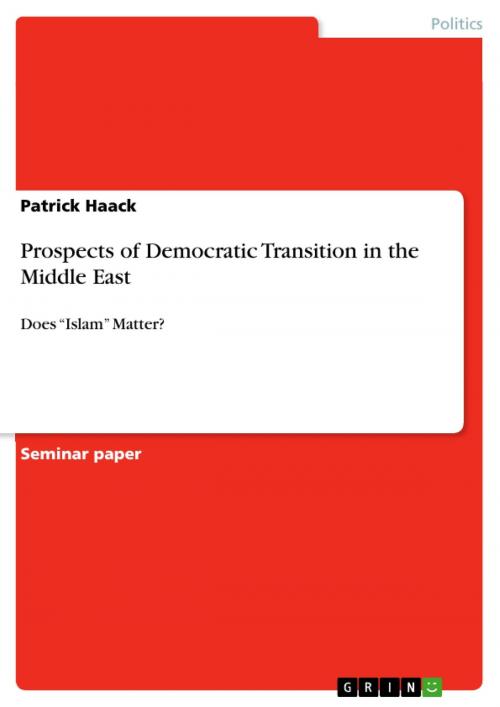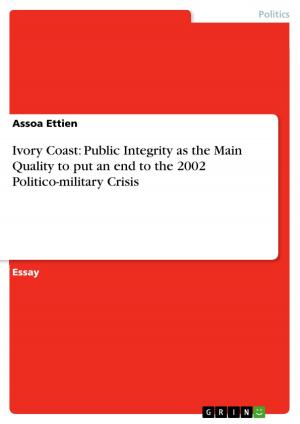Prospects of Democratic Transition in the Middle East
Does 'Islam' Matter?
Nonfiction, Social & Cultural Studies, Political Science, International, International Relations| Author: | Patrick Haack | ISBN: | 9783638025881 |
| Publisher: | GRIN Publishing | Publication: | March 14, 2008 |
| Imprint: | GRIN Publishing | Language: | English |
| Author: | Patrick Haack |
| ISBN: | 9783638025881 |
| Publisher: | GRIN Publishing |
| Publication: | March 14, 2008 |
| Imprint: | GRIN Publishing |
| Language: | English |
Seminar paper from the year 2005 in the subject Politics - International Politics - Region: Near East, Near Orient, grade: 1,0, York University, course: Transitions from Authoritarianism, 73 entries in the bibliography, language: English, abstract: The topic of this paper is the relationship between Islamic political culture and democratic transtion in the Middle East. It scrutinizes the question of the salience of Islam as an explantory variable for political and institutional outcomes - in this case a country's regime type. The setting of Islam in quotations marks in this paper's title indicates the author's conviction that Islam is a complex phenomenon that prohibits simple definitions or conceptualizations. Like Christianity, Islam is a term that works in a certain distance: at close range, finer distinctions are necessary. Of course, there is a common core to the diverse expressions of Islam, but what is at the core, its size and halo varies considerably. In making this issue explicit, I hope to mitigate negative impacts of manifest generalizations in this paper. The reader has to be aware of the fact that for reasons of analytical clearness the complexity of the topic has been notably reduced. Due to restrictions in space (course director B. Frolic: 'I have to read all the stuff') and the author's relative ignorance of the subject (notwithstanding extensive discussions about the subject matter on a five hour taxi drive from the ranges of the Atlas-mountains to Marrakesh, and contacts to Islamic fundamentalists in Granada, Al-Andaluz) this paper sketches only some relevant topics of the debate. Another issue to mention here is that my approach is normative: The spread of 'democracy' (as a form of government) is viewed as desirable for human beings, independent of their socio-cultural background. I try to take a pragmatic approach, being aware that there is no such thing as true 'objectivity' - 'knowledge' and 'facts' are what socially is agreed on (Berger and Luckman 1966). Thus, I agree very much with Edward Said's remark: 'No production of knowledge in the human sciences can ever ignore or disclaim its author's involvement as a human subject in his own circumstances' (1978, 11). As always, I am deeply indebted to my fabulous housemates and neighbours, being at the same time valuable proofreaders and good friends.
Seminar paper from the year 2005 in the subject Politics - International Politics - Region: Near East, Near Orient, grade: 1,0, York University, course: Transitions from Authoritarianism, 73 entries in the bibliography, language: English, abstract: The topic of this paper is the relationship between Islamic political culture and democratic transtion in the Middle East. It scrutinizes the question of the salience of Islam as an explantory variable for political and institutional outcomes - in this case a country's regime type. The setting of Islam in quotations marks in this paper's title indicates the author's conviction that Islam is a complex phenomenon that prohibits simple definitions or conceptualizations. Like Christianity, Islam is a term that works in a certain distance: at close range, finer distinctions are necessary. Of course, there is a common core to the diverse expressions of Islam, but what is at the core, its size and halo varies considerably. In making this issue explicit, I hope to mitigate negative impacts of manifest generalizations in this paper. The reader has to be aware of the fact that for reasons of analytical clearness the complexity of the topic has been notably reduced. Due to restrictions in space (course director B. Frolic: 'I have to read all the stuff') and the author's relative ignorance of the subject (notwithstanding extensive discussions about the subject matter on a five hour taxi drive from the ranges of the Atlas-mountains to Marrakesh, and contacts to Islamic fundamentalists in Granada, Al-Andaluz) this paper sketches only some relevant topics of the debate. Another issue to mention here is that my approach is normative: The spread of 'democracy' (as a form of government) is viewed as desirable for human beings, independent of their socio-cultural background. I try to take a pragmatic approach, being aware that there is no such thing as true 'objectivity' - 'knowledge' and 'facts' are what socially is agreed on (Berger and Luckman 1966). Thus, I agree very much with Edward Said's remark: 'No production of knowledge in the human sciences can ever ignore or disclaim its author's involvement as a human subject in his own circumstances' (1978, 11). As always, I am deeply indebted to my fabulous housemates and neighbours, being at the same time valuable proofreaders and good friends.















